新目标英语九年级第十二单元重点单词
- 格式:doc
- 大小:154.50 KB
- 文档页数:26
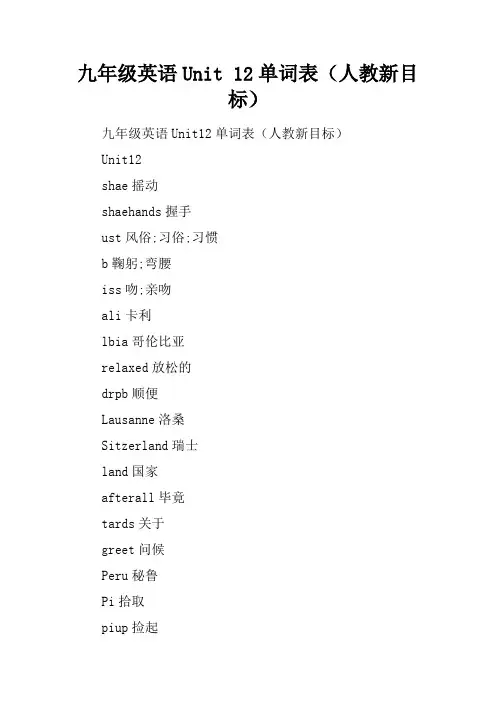
九年级英语Unit 12单词表(人教新目标)九年级英语Unit12单词表(人教新目标)Unit12shae摇动shaehands握手ust风俗;习俗;习惯b鞠躬;弯腰iss吻;亲吻ali卡利lbia哥伦比亚relaxed放松的drpb顺便Lausanne洛桑Sitzerland瑞士land国家afterall毕竟tards关于greet问候Peru秘鲁Pi拾取piup捡起ipe擦napin餐巾aeanise发出令人不愉快的声音sti刺rude粗鲁pint指gutfne'satdsth特地做某事aesbfeelathe使某人感到宾至如归anner礼貌tableanners餐桌礼仪beusedt/getusedt习惯于fr餐叉full吃饱的;lap大腿elb肘graduall逐渐partiular逐渐地plient称赞tast烤面包unfailiar不熟悉的spn调羹nife刀rd挤满rubbish垃圾see寻找hatline聊天热线nline联机的tpe打字stl多半abbreviatin缩略词fr构成phrase短语hphne同音异形异议词bine结合sbl象征puntuatin标点符号ar记号etin情感etin由字符组成的图释ln冒号braet括号beside在旁边e-ail电子邮riddle谜语learnbneself自学experient试验prper合适的pleased高兴的queue一队人nrall通常hse谁的Teresa特丽萨Lpez洛佩兹ar马克LeBlan勒布朗。
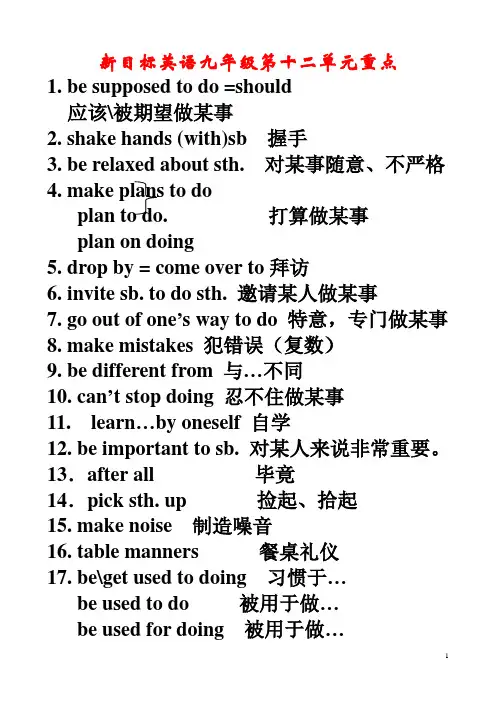
新目标英语九年级第十二单元重点1. be supposed to do =should应该\被期望做某事2. shake hands (with)sb握手3. be relaxed about sth.对某事随意、不严格4. make plans to doplan to do. 打算做某事plan on doing5. drop by = come over to拜访6. invite sb. to do sth. 邀请某人做某事7. go out of one’s way to do 特意,专门做某事8. make mistakes 犯错误(复数)9. be different from 与…不同10. can’t stop doing 忍不住做某事11. learn…by oneself 自学12. be important to sb. 对某人来说非常重要。
13.after all 毕竟14.pick sth. up 捡起、拾起15. make noise 制造噪音16. table manners 餐桌礼仪17. be\get used to doing习惯于…be used to do 被用于做…be used for doing被用于做…used to do 过去常常做…18. be relaxed about 对…感到随意19、at the table 在餐桌上20、point at sb 指向某人21.be full of sth = be filled with sth充满/装满…22.be unfamiliar to sb with sth 不熟悉23.be crowded with people 挤满了人24.at the proper time 在合适的时间25. be + 分钟+ late 迟到(多久)26. what's more 而且27. thanks for doing sth 为….感谢28. find/feel it+adj.+to do sth.发现\感觉做sth怎么样29. begin with 从…..开始30. in the traditional way 用传统的方法31. make faces 做鬼脸32. send a message to sb. on a mobile phone用手机发短息给sbUnit 14Have you packed yet ?一、重点短语1 clean out 清除2 some day=one day 来日/有一天3 be off=go away 离开4 so far 到目前为止5 thousands of 成千上万hundreds of 成百上千millions of 成万上亿two hundred people 2百人(做单位)6 go for a walk 去散步have a walk with sb 和某人去散步7 thanks to sb=because of多亏了某人thank sb for doing sth 为…而感谢某人8 pack sth/your clothes 打包某物/衣服9 buy/have a city map/street map买/有一张城市街道图10 take/have a bath 洗澡bathing suit 泳装11 a suit of clothes 一套衣服12 travel guidebook 旅游指南13 clean out the refrigerator/cupboard 洗冰箱/橱柜clean up the park 清扫公园14 feed sb\sth with\on。
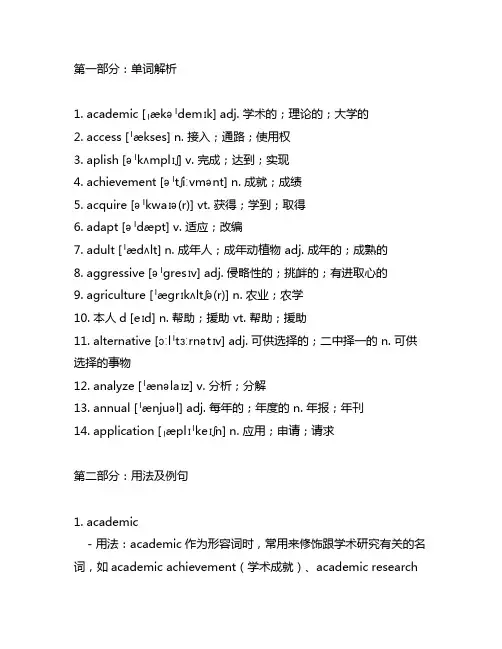
第一部分:单词解析1. academic [ˌækəˈdemɪk] adj. 学术的;理论的;大学的2. access [ˈækses] n. 接入;通路;使用权3. aplish [əˈkʌmplɪʃ] v. 完成;达到;实现4. achievement [əˈtʃiːvmənt] n. 成就;成绩5. acquire [əˈkwaɪə(r)] vt. 获得;学到;取得6. adapt [əˈdæpt] v. 适应;改编7. adult [ˈædʌlt] n. 成年人;成年动植物 adj. 成年的;成熟的8. aggressive [əˈɡresɪv] adj. 侵略性的;挑衅的;有进取心的9. agriculture [ˈæɡrɪkʌltʃə(r)] n. 农业;农学10. 本人d [eɪd] n. 帮助;援助 vt. 帮助;援助11. alternative [ɔːlˈtɜːrnətɪv] adj. 可供选择的;二中择一的 n. 可供选择的事物12. analyze [ˈænəlaɪz] v. 分析;分解13. annual [ˈænjuəl] adj. 每年的;年度的 n. 年报;年刊14. application [ˌæplɪˈkeɪʃn] n. 应用;申请;请求第二部分:用法及例句1. academic- 用法:academic作为形容词时,常用来修饰跟学术研究有关的名词,如academic achievement(学术成就)、academic research(学术研究)等。
- 例句:He has made significant academic achievements in the field of physics.(他在物理学领域取得了显著的学术成就。
)2. access- 用法:access作为名词时,常表示“接入”或“通路”的意思;作为动词时,表示“使用权”或“接近”的意思。
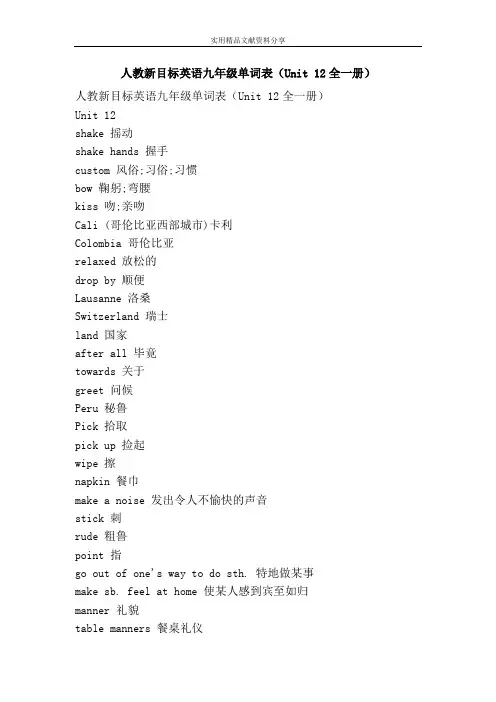
人教新目标英语九年级单词表(Unit 12全一册)人教新目标英语九年级单词表(Unit 12全一册)Unit 12shake 摇动shake hands 握手custom 风俗;习俗;习惯bow 鞠躬;弯腰kiss 吻;亲吻Cali (哥伦比亚西部城市)卡利Colombia 哥伦比亚relaxed 放松的drop by 顺便Lausanne 洛桑Switzerland 瑞士land 国家after all 毕竟towards 关于greet 问候Peru 秘鲁Pick 拾取pick up 捡起wipe 擦napkin 餐巾make a noise 发出令人不愉快的声音stick 刺rude 粗鲁point 指go out of one's way to do sth. 特地做某事make sb. feel at home 使某人感到宾至如归manner 礼貌table manners 餐桌礼仪be used to /get used to 习惯于... fork 餐叉full 吃饱的;lap 大腿elbow 肘gradually 逐渐particular 逐渐地compliment 称赞toast 烤面包unfamiliar 不熟悉的spoon 调羹knife 刀crowd 挤满rubbish 垃圾seek 寻找chatline 聊天热线online 联机的type 打字mostly 多半abbreviation 缩略词form. 构成phrase 短语homophone 同音异形异议词combine 结合symbol 象征punctuation 标点符号mark 记号emotion 情感emoticon 由字符组成的图释colon 冒号bracket 括号beside 在...旁边e-mail 电子邮件riddle 谜语learn...by oneself 自学experiment 试验proper 合适的pleased 高兴的queue 一队人normally 通常whose 谁的Teresa 特丽萨Lopez 洛佩兹Marc 马克LeBlanc 勒布朗。
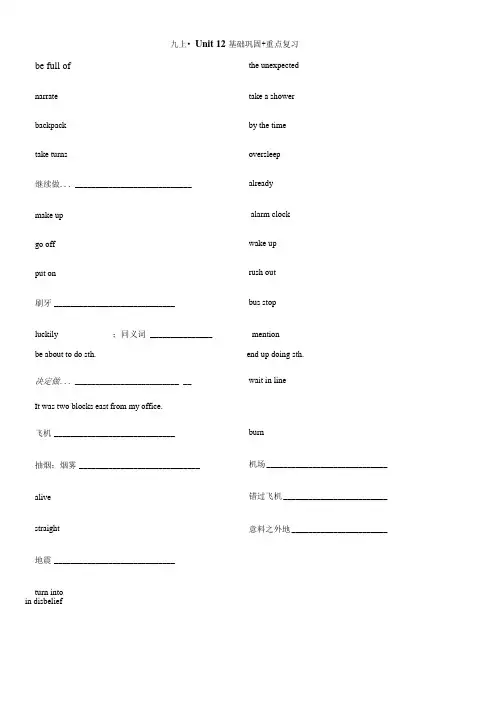
九上• Unit 12 基础巩固+重点复习end up doing sth.决定做... _________________________ __ wait in lineIt was two blocks east from my office.飞机_____________________________抽烟;烟雾_____________________________ alive _____________________________straight _____________________________地震_____________________________turn intoin disbelief _________________________ burn _____________________________ 机场_____________________________ 错过飞机_________________________ 意料之外地_______________________be full of _________________________ narrate _____________________________ backpack _____________________________take turns _____________________________继续做... ____________________________ make up _____________________________go off _____________________________put on _____________________________刷牙_____________________________luckily ____________ ;同义词 _______________ the unexpectedtake a showerby the time __________________________ oversleep ____________________________ already ____________________________ alarm clockwake up _____________________________ rush out _____________________________ bus stopmentionbe about to do sth.Before I could join the others outside to see what was going on, the first plane had already hit my office building.(过去完成时)By the time I got to the airport, my plane to New Zealand had already taken off.(过完;by the time 引导时间状从)opposite ____________________________below ________________ ;反义词 ______________ 浴室______________________________course ____________________________bean _____________________________false _____________________________a costume party ______________________________ stay up _____________________________on April FooPs Day ___________________________ trick _____________________________an introduction to sb./sth. _______________________ activate _____________________________ celebration _____________________________ announce ___________________________hoax _____________________________lose weight _____________________________alien _____________________________land (多词性)_________________________ dead _________________ ; n. ________________stare at _____________________________cream ____________________________send out ____________________________invitation _________________ ; v. ___________________ description _____________________________get dressed _____________________________recently ____________________________play jokes on sb. _____________________________例子_____________________________background knowledge _____________________________ topic _____________________________take place ______________________________当地的_____________________________sth. is sold out _____________________________ customer ______________________________Mars _____________________________猜,猜测______________________________It is a day when many people play all kinds of (ricks and jokes on each other.(定语从句)believable ____________________________run away _____________________________ embarrassing _____________________________在学校的第一天___________________________________________What is the date?___________________________________________ discovery _____________________________truck ______________________________bakery ____________________________hand inappear __________________ :反义词__________ vote fbr ______________________________有创造力的_____________________________back _____________________________unlucky __________________ ;同义词__________meat _____________________________accident _____________________________主人,所有者______________________________。
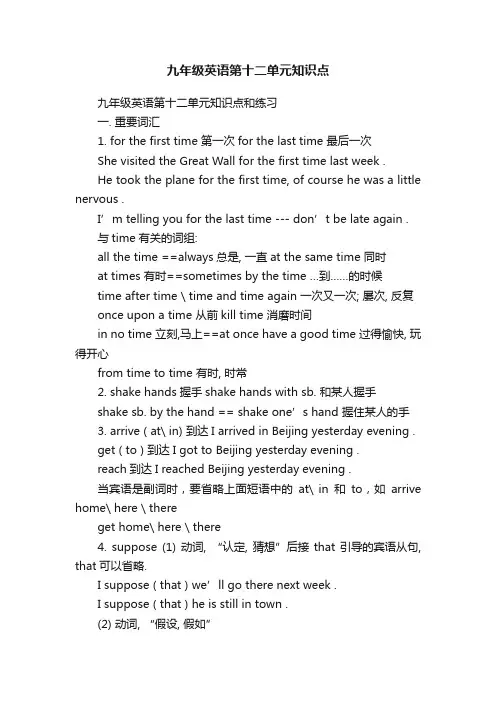
九年级英语第十二单元知识点九年级英语第十二单元知识点和练习一. 重要词汇1. for the first time 第一次for the last time 最后一次She visited the Great Wall for the first time last week .He took the plane for the first time, of course he was a little nervous .I’m telling you for the last time --- don’t be late again .与time有关的词组:all the time ==always总是, 一直at the same time 同时at times 有时==sometimes by the time …到……的时候time after time \ time and time again 一次又一次; 屡次, 反复once upon a time 从前kill time 消磨时间in no time 立刻,马上==at once have a good time 过得愉快, 玩得开心from time to time 有时, 时常2. shake hands 握手shake hands with sb. 和某人握手shake sb. by the hand == shake one’s hand 握住某人的手3. arrive ( at\ in) 到达I arrived in Beijing yesterday evening .get ( to ) 到达I got to Beijing yesterday evening .reach到达I reached Beijing yesterday evening .当宾语是副词时,要省略上面短语中的at\ in和to,如arrive home\ here \ thereget home\ here \ there4. suppose (1) 动词, “认定, 猜想”后接that引导的宾语从句, that可以省略.I suppose ( that ) we’ll go there next week .I suppose ( that ) he is still in town .(2) 动词, “假设, 假如”Suppose he be here on time , what shall we do ?(3 ) be supposed to do sth.=== should 应该做某事其否定结构为be not supposed to do sth 不应该做某事Everyone is supposed to wear a seat-belt (安全带) in the car .Teachers are supposed to treat all the students alike .老师应该对所有学生一视同仁.You are not supposed to smoke on the bus .We are not supposed to play football on Sunday .It’s a secret , I’m not supposed to tell you.5.relax 动词, “使轻松, 使休息”Let’s relax ourselves by listening to music .relaxed 形容词, 某人“感到松懈的, 感到放松的”I felt relaxed after the competition .relaxing 形容词, 某物“令人松懈的, 令人轻松的”I like those relaxing country songs .6.drop by 顺便来访He dropped by to see what happened here yesterday .7. make plans to do sth \ plan to do sth. \ make plans for sth. 计划做某事We made plans for the next meeting yesterday .She often makes plans to improve her English .8. without 介词, “无, 没有”(1) without sth. 没有某物A man without a friend is only half a man .She went to work without breakfast this morning .Without air or water , we couldn’t live .(2) without doing sth. 没有做某事She spoke without thinking .He left without saying goodbye .(3) without短语常可转换成状语从句或并列句.Without your help I can’t work out the problem .== If you don’t help me I can’t work out the problem .He went out without saying a word .=== he went out and didn’t say a word .(4) without 短语作定语时, 可以转换为定语从句.Have you seen a man without friends ?== have you seen a man who has no friends ?9. pick up (1) 捡起,拾起It’s a good habit to pick up the little( 2 ) (车辆等) 中途搭人\ 带货The car stopped and picked me up . 10. every time , next time , last time 等表示时间的短语后跟一个从句, 用来作主句的时间状语.Every time I come , I always find he is busy playing computer games .Last time you left the house , you forgot to lock the door .11. point at 指向较近的人或物The teacher is pointing at the map on the wall .point to 指向较远的人或物He pointed to the house on the other side of the river and said, “That’s my home .”point out 指出(方向,要点,错误等)The teacher pointed out many mistakes in my homework .12. go out of one’s way to do sth. 特意(花心血、时间)做某事, 故意做某事He went out of his way to help me .We go out of our way to build our country .13. make sb \ oneself feel at home 使某人感觉在家里, 很随意, 无拘束Sit down and make yourself feel at home .14. first 首先强调动作的先后角度Before I go, I must first change my clothes .at first == at the beginning 起初; 含有“后来不这样了”的意思At first I didn’t like her , but now I do .first of all 首先, 第一; 指按时间顺序处于第一First of all , we must check the number .First of all , let me say how glad I am to be here .above all 首先,最重要的是== the most important of all 强调重要性We must work hard, and above all we must believe thateach of us is able to do something well .after all 毕竟---- I’m sorry. I didn’t do it well .---- Never mind . A fter all, it’s the first time for you to do it .15. 含有up 的词组:stand up 站起来grow up 长大send up 发射climb up 爬上get up 起床pick up 捡起put up 张贴,搭建look up 查找set up 建立eat up 吃关use up 用完cut up切开give up 放弃clean up 清理fix up 修理16.begin with== start off with 以……开始The concert begin with the National Anthem (国歌)Begin with this one and do the others afterwards .We will begin with \ start off with music .end with 以……结尾In his speech, he began with a proverb and ended with a joke .17. 可以充当句子主语的结构:(1) 名词作主语: This picture is beautiful .(2) 代词作主语: I love you .(3) 形容词作主语: The old must be taken good care of .(4) 基数词作主语: Two and three is five .(5) 动名词作主语: Seeing is believing .(6) 动词不定式作主语: To study hard is our duty .(7) 并列结构作主语: Reading and writing are very important .(8) 主语从句作主语: What she did is not yet known .What she says isn’t always true .18. search 指对某处、某地进行搜查或搜索,对人时为搜身。
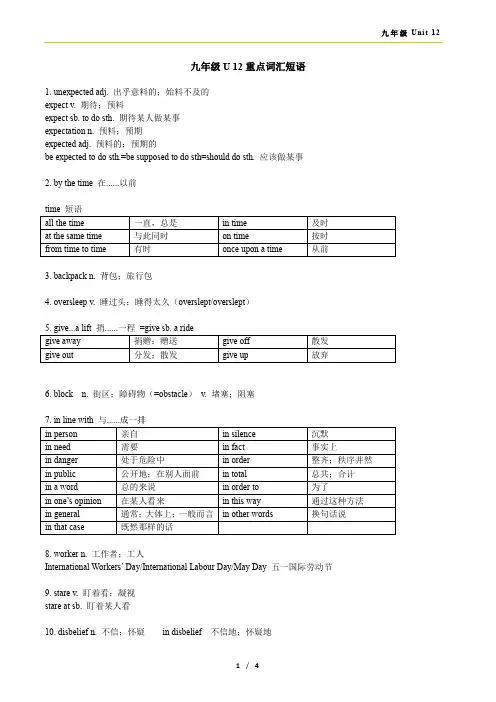
九年级U 12重点词汇短语1. unexpected adj. 出乎意料的;始料不及的expect v. 期待;预料expect sb. to do sth. 期待某人做某事expectation n. 预料;预期expected adj. 预料的;预期的be expected to do sth.=be supposed to do sth=should do sth. 应该做某事2. by the time 在......以前3. backpack n. 背包;旅行包4. oversleep v. 睡过头;睡得太久(overslept/overslept)6. block n. 街区;障碍物(=obstacle)v. 堵塞;阻塞8. worker n. 工作者;工人International Workers’ Day/International Labour Day/May Day 五一国际劳动节9. stare v. 盯着看;凝视stare at sb. 盯着某人看10. disbelief n. 不信;怀疑in disbelief 不信地;怀疑地belief n. 相信;看法;信念believe v. 相信;认为believe it or not 信不信由你believable adj. 可相信的;可信任的unbelievable adj. 难以置信的11. above prep. 在......上面;(斜上方)adv. 在上面反义词为below12. burnv. (burnt/burnt; burned/burned) 着火;燃烧n. 烧伤;烫伤;灼伤burned adj. 燃烧的13. burning adj. 着火的,燃烧的;强烈的,极度的14. alive adj. 活着;有生气的live v. 居住;生活adj. 活的;现场直播的lively 生气勃勃的;(色彩)鲜艳的15. airport n. 机场16. till prep. & conj. 到;直到=untiltill now=until now=so far=up to now 现完标志词not…until... 直到......才......17. west adv. 向西;朝西adj. 向西的;西部的n.西;西方18. cream n. 奶油;乳脂adj. 奶油色的;淡黄色的;米色的ice cream 冰激凌19. workday n. 工作日20. pie n. 果馅饼;果馅派pie chart 饼图(pie graph)21. show up 赶到;露面show off 炫耀show (sb.) around 领(某人)参观;带(某人)巡视on show 展出22. bean n. 豆;豆荚23. market n. 市场;集市v. 推销;促销supermarket n. 超市24. by the end of 在(某时间点)以前by the end of +过去的时间——过去完成时25. fool n. 蠢人;傻瓜v. 愚弄make a fool of sb. 愚弄某人April Fool’s Day 愚人节foolish adj. 愚蠢的26. costume n. (特定场合穿的)服装;装束27. embarrassed adj. 窘迫的;害羞的embarrass v. 使窘迫;使尴尬embarrassment n. 害羞;窘迫;难堪;28. costume party 化妆舞会29. announce v. 宣布;宣告announcement n. 公告;布告;通告announcer n. (广播、电视的)广播员;播音员30. spaghetti n. 意大利面条31. hoax n. 骗局;恶作剧(-es)v. 捉弄;欺骗32. sell out 卖光(be sold out)33. discovery n. 发现;发觉discover v. 发现;发觉discoverer n. 发现者34. lady n. 女士;女子35. cancel v. 取消;终止36. officer n. 军官;官员37. believable adj. 可相信的;可信任的38. disappear v. 消失;失踪;灭绝;消亡39. embarrassing adj. 使人害羞的(难堪的或惭愧的)40.rush out of the door冲出门48.lose weight减肥41.go off(闹钟)发出响声49.as much as one can尽可能多42.jump out of bed 从床上跳下来50.happen to sb.发生在某人身上43.wait in line排队等候51.end up doing sth.以做某事而告终44.be about to do sth.即将做某事52.rather than而不是45.think to oneself盘算53.the whole country整个国家46.in line with与....成一排54.get married to sb.和某人结婚47.take place发生55.hand in 上交。
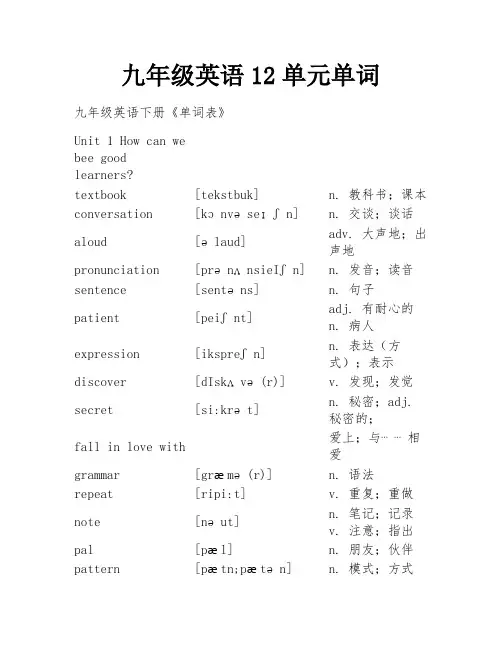
九年级英语12单元单词九年级英语下册《单词表》Unit 1 How can webee goodlearners?textbook[tekstbuk]n. 教科书;课本conversation[kɔnvəseɪʃn]n. 交谈;谈话aloud[əlaud]adv. 大声地;出声地pronunciation[prənʌnsieIʃn]n. 发音;读音sentence[sentəns]n. 句子patient[peiʃnt]adj. 有耐心的n. 病人expression[ikspreʃn]n. 表达(方式);表示discover[dIskʌvə(r)]v. 发现;发觉secret[si:krət]n. 秘密;adj. 秘密的;fall in love with 爱上;与⋯⋯相爱grammar[græmə(r)]n. 语法repeat[ripi:t]v. 重复;重做note[nəut]n. 笔记;记录v. 注意;指出pal[pæl]n. 朋友;伙伴pattern[pætn;pætən]n. 模式;方式physics[fiziks]n. 物理;物理学chemistry[kemistri]n. 化学partner[pa:(r)tnə(r)]n. 搭档;同伴pronounce[prənauns]v. 发音increase[Inkri:s]v. 增加;增长speed[spi:d]n. 速度 v.加速ability[əbiləti]n. 能力;才能brain[brein]n. 大脑active[æktiv]adj. 活跃的;积极的attention[ətenʃn]n. 注意;关注pay attention to注意;关注connect[kənekt]v. (使)连接;与⋯⋯有联系connect … with 把⋯⋯和⋯⋯连接或联系起来overnight[əuvə(r)nait]adv. 一夜之间;在夜间review[rivju:]v. & n. 回顾;复习knowledge[nɔlidʒ]n.知识;学问wisely[waizli]adv. 明智地;聪明地Annie[æni]安妮(女名)Alexander Graham Bell 格雷厄姆•贝尔Unit2 I think that mooncakesare delicious!lantern[læntə (r)n]n. 灯笼stranger[streindʒə(r)]n. 陌生人relative[relətiv]n. 亲属;亲戚put on 增加(体重);发胖pound[paund]n. 磅(重量单位);英镑folk[fəulk]adj. 民间的;民俗的goddess[gɔdes]n. 女神steal[sti:l]v. (stole ; stolen) 偷;窃取lay[lei]v. (laid; laid) 放置;安放;产(卵);下(蛋)lay out摆开;布置dessert[di’zə:(r)t]n. (饭后)甜点;甜食garden[ga:(r)dn]n. 花园;园子admire[ədmaiə(r)]v. 欣赏;仰慕tie[tai]n. 领带 v. 捆;束haunted[hɔ:ntid]a. 有鬼魂出没的;闹鬼的ghost[gəust]n. 鬼;鬼魂trick[trik]n. 花招;把戏treat[tri:t]n. 款待;招待v. 招待;请客spider[spaidər)]n. 蜘蛛Christmas[krisməs]n. 圣诞节fool[fu:l]n. 蠢人;傻瓜v. 愚弄adj. 愚蠢的lie[laI]v. (lay ;lain) 平躺;处于novel[nɔvl]n. (长篇)小说eve[i:v]n. (尤指宗教节假日的)前夕;前夜bookstore[bukstɔ:(r)]n. 书店dead[ded]adj. 死的;失去生命的business[biznəs]n. 生意;商业punish[pʌnis]v. 处罚;惩罚warn[wɔ:(r)n]v. 警告;告诫present[preznt]n. 现在;礼物adj. 现在的nobody[nəubədi]pron. 没有人warmth[wɔ:(r)mθ]n. 温暖;暖和spread[spred]v. 传播;展开n. 蔓延;传播Macao[məkau[ 澳门Chiang Mai[dʒa:nmaI[ 清迈(泰城市)Halloween[hæləui:n[ 万圣节前夕St. Valentine’sDay[seint væləntainz]情人节Clara[kla:rə]克拉拉(女名)Santa Claus[sæntəklɔ:z] 圣诞老人Charles Dickens [tʃa:(r)lz;dikənz]查尔斯•狄更斯(英)Scrooge[skru:dʒ]斯克鲁奇 n.(非正式)吝啬鬼Jacob Marley[dʒeikəb;ma:(r)li]雅各布•马利Unit3 Could youplease tell mewhere therestrooms are?restroom[restru:m]n. (美)洗手间;公共厕所stamp[stæmp]n. 邮票;印章postcard[pəustka:(r)d]n. 明信片pardon[pa:(r)dn]interj. 请再说一遍;washroom[wɔʃru:m]n. 洗手间;厕所bathroom[ba:θru:m]n. 浴室;洗手间quick[kwik]adj. 快的;迅速的rush[rʌʃ]v.& n. 仓促;急促suggest[sədʒest]v. 建议;提议staff[sta:f]n. 管理人员;职工grape[greip]n. 葡萄central[sentrəl]adj. 中心的;中央的mail[meil]v. 邮寄;发电子邮件n. 邮件east[i:st]adj. 东方的adv. 向东;n.东方fascinating[fæsineitiŋ]a. 迷人的;有吸引力的convenient[kənvi:niənt]a. 便利的;方便的mall[mɔ:l]n. 商场;购物中心clerk[kla:k;kl:rk]n. 职员corner[kɔ:(r)nə(r)]n. 拐角;角落polite[pəlait]adj. 有礼貌的;客气的politely[pəlaitli]adv. 礼貌地;客气地speaker[spi:kə(r)]n. 讲(某种语言)的人;发言者request[rikwest]n. 要求;请求choice[tʃɔis]n. 选择;挑选direction [direkʃn;dairekʃn]n. 方向;方位correct[kərekt]adj. 正确的;恰当的direct[direkt; dairekt]adj. 直接的;直率的whom[hu:m]pron. 谁;什么人address[ədres; ædres]n. 地址;通讯处faithfully[feiθfəli]adv. 忠实地;忠诚地Italian[Itæliən]a. 意大利人的;n. 意大利人语Kevin[kevin]凯文(男名)Tim[tim]蒂姆(男名)Unit4 I used to beafraid of the dark.humorous[hju:mərəs]a. 有幽默感的;滑稽的silent[sailənt]adj. 不说话的;沉默的helpful[helpfl]adj. 有用的;有帮助的from time to time 时常;有时score[skɔ:(r)]n. & v. 得分;打分background[bækgraund]n. 背景interview[Intə(r)vju:]v. 采访;面试n.访谈Asian[eiʃn ]a. 亚洲的;n. 亚洲人deal with 对付 ; 应付dare[deə]v. 敢于;胆敢private[praivət]adj. 私人的;私密的guard[ga:(r)d]n. 警卫;看守v. 守卫;保卫require[rikwaiə(r)]v. 需要;要求European[ju(ə)rəpi:ən] a. 欧洲人的British[britiʃ]adj.英国的;英国人的speech[spi:tʃ]n.讲话;发言ant[ænt]n. 蚂蚁insect[insekt]n. 昆虫influence[influəns]v. & n. 影响seldom[seldəm]adv. 不常;很少proud[praud]adj. 自豪的;骄傲的be proud of 为⋯⋯骄傲;感到自豪absent[æbsənt]adj. 缺席;不在fail[feil]v. 失败;未能(做到)examination[igzæmineiʃn]n. 考试;审查boarding school [bɔ:(r)diŋ]寄宿学校in person亲身;亲自exactly[igzæktli]adv. 确切地;精确地pride[praid]n. 自豪;骄傲take pride in为⋯⋯感到自豪grandson[grænsʌn]n. 孙子;外孙general[dʒenrəl]a. 普遍的;常规的;总的 n. 将军introduction[intrədʌkʃn]n. 介绍Paula[pɔ:lə]葆拉(女名)Alfred[ælfrid]艾尔弗雷德(男名)Billy[bili]比利(男名)Candy[kændi]坎迪(女名)Jerry[dʒeri]杰里(男名);杰丽(女名)Emily[emili]埃米莉(女名)Unit5 What are theshirts made of?material[mətiəriəl]n. 材料;原料chopsticks[tʃɔpstiks]n.筷子coin[kɔin]n.硬币fork [fɔ:k]n.餐叉,叉子blouse[blauz]n. (女士)短上衣;衬衫sliver[silvə]n.银,银器; adj.银色的glass[glas]n. 玻璃cotton[kɔtn]n.棉;棉花steel[sti:l]n. 钢;钢铁grass[gras]n. 草;草地leaf[li:f]n. 叶,叶子produce[prədju:s]v. 生产;制造;出产widely[waidli]adv. 广泛地;普遍地process[prəuses]v. 加工;处理France[fra:ns ]法国no matter 不论 ;无论local[ləukl]adj. 当地的;本地的even though虽然;即使brand[brænd]n. 品牌;牌子avoid[əvɔid]v. 避免;回避product[prɔdʌkt]n. 产品;制品handbag[hændbæg]n. 小手提包mobile[məubail] a. 可移的;非固定的Germany[dʒə:(r)məni]n. 德国surface[sə:(r)fis]n. 表面;表层postman[pəustmən]n. 邮递员cap[kæp]n. (.尤指有帽舌的)帽子glove[glʌv]n. (分手指的)手套international[intə(r)næʃnəl]adj. 国际的petitor[kəmpetitə(r)]n. 参赛者;竞争者paint[peint]v. 用颜料画;刷漆its[its]adj. 它的form[fɔ:(r)m]n. 形式;类型clay[klei]n. 黏土;陶土balloon[bəlu:n]n. 气球scissors[sizə(r)z]n. (pl.) 剪刀lively[laivli] a. 生气勃勃的;(色彩)鲜艳的fairy tale[feri; teil]n. 童话故事heat[hi:t]n. 热;高温polish[pɔliʃ]v.磨光;修改;润色plete[kəmpli:t]v. 完成Korea[kəri:ə]朝鲜;韩国Switzerland[switsə(r)lənd]瑞士San Francisco[sæn frənsiskəu]圣弗朗西斯科(旧金山,美国城市)Pam[pæm]帕姆(女名)Unit6 When was itinvented?heel[hi:l]n. 鞋跟;足跟electricity[ilektrisəti]n. 电;电能scoop[sku:p]n. 勺; 铲子style[stail]n. 样式; 款式project[prədʒekt]n. 项目;工程pleasure[pleʒə(r)]n. 高兴;愉快zipper[zipə(r)]n. (= zip) 拉链;拉锁daily[deili]adj. 每日的;日常的website[websait]n. 网站pioneer[paiəniə]n.先锋;先驱list[list]v. 列表;列清单n. 名单;清单mention[menʃn]v. 提到;说到by accident 偶然;意外地nearly[niəli]adv. 几乎;差不多boil[bɔil]v. 煮沸;烧开smell[smel]n. 气味v. 发出气味;闻到saint[seint]n. 圣人;圣徒take place 发生;出现doubt[daut]n. 疑惑;疑问 v. 怀疑without doubt 毫无疑问;的确fridge[fridʒ]n.冰箱translate[trænsleit]v. 翻译lock[lɔk; la:k]v. 锁上;锁住earthquake[ə:(r)θkweik]n. 地震sudden[sʌdən]adj. 突然(的)all of a sudden 突然 ; 猛地biscuit[biskit]n. 饼干cookie[kuki]n. 曲奇饼干instrument[instrumənt]n. 器械;仪器;工具crispy[krispi]adj. 脆的;酥脆的sour[sauə(r)]adj. 酸的;有酸味的by mistake错误地;无意中customer[kʌstəmə(r)]n. 顾客;客户Canadian[kəneidiən] a. n. 加拿大; 人的divide[divaid]v. 分开;分散divide ... into把⋯⋯分开purpose[pə:(r)pəs]n. 目的;目标basket [ba:skit]n. 篮;筐the Olympics[əulimpiks]奥林匹克运动会look up to钦佩;仰慕hero[hiərəu]n.英雄;男主角Berlin[bə:lin]柏林(德国城市)NBA (National Basketball Association)CBA (China Basketball Association)Chelsea Lanmon[tʃelsi; lænmən]切尔西•兰曼Jayce Coziar[dʒeis; kəuzia]杰斯•克里亚Jamie Ellsworth [dʒeimi;elzwə:(r)θ]杰米•埃尔斯沃恩Julie Thompson[dʒu:li; tɔmpsən]朱莉•汤普森Whitb Judson[witkəm;dʒʌdsən]惠特科姆•贾德森Thomas Watson[tɔməs; wɔtsən]托马斯•沃森George Crum [dʒɔ:(r)dʒ;krʌm]乔治•克拉姆James n.ai smith[dʒeimz; naismiθ]詹姆斯•奈史密斯Unit7 Teenagers shouldbe allowed to choosetheir own clothes.smoke[sməuk]v. 冒烟;吸烟 n. 烟pierce[piəs; pirs]v. 扎;刺破;穿透license[laIsns]n.(= licence) 证;证件safety[seifti]n. 安全;安全性earring[iəriŋ]n. 耳环;耳饰cry[krai]v. & n. 哭;叫喊field[fi:ld]n. 田野;场地hug[hʌg]n.& v. 拥抱;搂抱lift[lIft]v. 举起;抬高talk back回嘴;顶嘴awful[ɔ:fl]adj. 很坏的;讨厌的teen[ti:n]n. 十几岁(十三至十九岁之间)regret[rigret]v. 感到遗憾;懊悔poem[pəuim]n. 诗;韵文bedroom[bedru:m]n. 卧室munity[kəmju:nəti]n. 社区;社团keep away from避免接近;远离chance[tʃa:ns]n. 机会;可能性make one’s own decision自己做决定manage[mænidʒ]v.设法做到;应付(困难局面)society[səsaiəti]n. 社会unit [ju:nit]n. 单位;单元educate[edʒukeit]v. 教育;教导get in the way of挡……的路;妨碍professional[prəfeʃənl] a. 职业的;专业的enter[entə(r)]v. 进来;进去support[səpɔ:(r)t]v. & n. 支持Picasso[pikæsəu]毕加索(西班牙画家)Unit8 It must belong toCarla.truck[trʌk]n. 卡车;货车rabbit[ræbIt]n. 兔;野兔whose[hu:z]adj. & pron. 谁的;(特)那个人的attend[ətend]v. 出席;参加valuable[væljuəbl] a. 很有用的;宝贵的pink[pink]adj. 粉红色的n. 粉红色picnic[piknik]n. 野餐somebody[sʌmbədi]pron. 某人;重要人物anybody[enibədi]pron. 任何人noise[nɔiz]n. 声音;噪音policeman[pəli:smən]n. 男警察wolf[wulf]n. 狼laboratory[ləbɔrətri]n. 实验室coat[kəut]n. 外套;外衣sleepy[sli:pi]adj. 困倦的;瞌睡的pocket[pɔkit]n. 衣袋;口袋alien[eiliən]n. 外星人suit[sju:t;su:t]n. 西服;套装express[ikspres]v. 表示;表达not only … but also不但……,而且circle[sə:(r)kl]n. 圆圈 v. 圈出Britain[britn]n. (= Great Britain) 大不列颠receive[risi:v]v. 接受;收到leader[li:də(r)]n. 领导;领袖midsummer[mIidsmə(r)]n. 仲夏;中夏medical[medikl]adj. 医疗的;医学的prevent[privent]v. 阻止;阻挠energy[enə(r)dʒi]n. 精力;力量position[pəziʃn]n. 位置;地方burial[beriəl]n. 埋葬;安葬honor[ɔnə]v.(= honour) 尊重;表示敬意 n. 荣幸ancestor[ænsestə(r)]n. 祖宗;祖先victory[viktəri]n. 胜利;成功enemy[enəmi]n. 敌人;仇人period[piəriəd]n. 一段时间;时期mystery[mistri]n. 奥秘;神秘事物Stonehenge[stəunhendʒ]巨石阵Carla[ka:(r)lə]卡拉(女名)J. K. Rowling[rəuliŋ]J. K. 罗琳(英国作家)Victor[viktə(r)]维克托(男名)Jean[dZ=ʒi:n]琼(女名)Paul Stoker[stəukə(r)]保罗•斯托克Unit9 I like music thatI can dance to.prefer[prifə:(r)]v. 更喜欢Lyrics[liriks]n.(pl.) 歌词Australian[ɔstreiliən] a. 澳大利亚;人的n.澳大利亚人electronic[ilektrɔnik] a. 电子(设备)的suppose[səpəuz]v. 推断;料想smooth[smu:θ]adj. 平滑的;悦耳的spare[speə]adj. 空闲的;不用的case [keIs]n. 情况;实情in that case 既然那样;假使那样的话war[wɔ:(r)]n. 战争;战争状态director[direktə]n.导演;部门负责人dialogue[daiəlɔg ]n. (=dialog) 对话;对白documentary[dɔkjumentri]n. 纪录片drama[dra:mə]n.戏;剧plenty[plenti[ pron. 大量;众多plenty of 大量;充足shut[ʃʌt]v. (shut; shut) 关闭;关上superhero[su:pə(r)hiərəu]n.超级英雄horror[hɔrə]n.震惊;恐惧thriller[θril@(r)]n. 惊险电影(小说、戏剧intelligent[intelIdʒənt] a. 有才智的;聪明的sense[sens]v. 感觉到;意识到n. 感觉;意识pain[pein]n. 痛苦;苦恼reflect[riflekt]v. 反映;映出perform[pə(r)fɔ:(r)m]v. 表演;执行amazing[əmeiziŋ] a.令人惊奇 ;喜的pity[piti]n. 遗憾;怜悯total[təutl]n. 总数;合计a. 总的;全体的in total总共;合计master[ma:stə]n. 能手;主人 v. 掌握praise[preiz]v. & n. 表扬;赞扬national[næʃnl]adj. 国家的;民族的recall[rikɔ:l]v. 回忆起;回想起wound[wu:nd]n. 伤;伤口;创伤World War II 二战Titanic[taitænik]《泰坦尼克号》(电影名)Carmen[ka:(r)men]卡门(女名)Dan Dervish[dæn; də:(r)viʃ]丹•德维什Unit10 You're supposedto shake hands.custom[kʌstəm]n. 风俗;习俗bow[bau ]v. 鞠躬kiss[kis]v. & n. 亲吻;接吻greet[gri:t]v. 和⋯⋯打招呼;迎接value[vælju:]v. 重视;珍视n. 价值everyday[evridei]adj. 每天的;日常的drop by顺便访问;随便进入capital[kæpitl]n. 首都;国都noon[nu:n]n. 正午;中午mad[mæd]adj. 很生气;疯的get mad 大动肝火;气愤make an effort 作出努力traffic[træfik]n.交通;路上行驶的车辆somewhere[sʌmweə]adv. 在某处;到某处passport[pa:spɔ:t ]n. 护照chalk[tʃɔ:k]n. 粉笔blackboard[blækbɔ:(r)d]n. 黑板northern[nɔ:(r)ð(r)n]adj. 北方的;北部的coast[kəust]n. 海岸;海滨season[si:zn]n. 季;季节knock[nɔk]v. 敲;击eastern[i:stə(r)n]adj. 东方的;东部的worth[wə:(r)θ]adj.值得;有价值(的)manner[mænə(r)]n. 方式;方法(pl.) 礼貌;礼仪empty[empti]adj. 空的;空洞的basic[beisik]adj. 基本的;基础的exchange[ikstʃeindʒ]n.& v. 交换go out of one’s way 特地;格外努力make ... feel at home 使(某人)感到宾至如归granddaughter[grændɔ:tə(r)]n. (外)孙女behave[biheiv]v. 表现;举止except[iksept]pre. 除……之外conj. 除了;只是elbow[elbəu]n.肘;胳膊gradually[grædʒuəli]adv. 逐步地;渐进地suggestion[sədʒestʃən]n. 建议Brazil[brəzil]巴西Mexico[meksikəu]墨西哥Cali[ka:li]卡利(哥伦比亚城市)Colombia[kəlʌmbiə]哥伦比亚(南美洲国家)Lausanne[ləuzæn]洛桑(瑞士城市)Norway[nɔ:(r)wei]挪威Maria[məri:ə]玛丽亚(女名)Katie[keiti]凯蒂(女名)Sato[sa:tɔ]佐藤(日本姓氏)Marie[məri:]玛丽(女名);马里(男名)Teresa Lopez[təri:zə; ləupez]特蕾莎•洛佩斯MarcLeBlanc[ma:(r)k; ləbla:ŋ]马克•勒布朗Unit11 Sad movies makeme cry.the more … the more… 越……越……leave out 不包括;不提及;忽略friendship[frendʃip]n. 友谊;友情king[kiŋ]n. 君主;国王prime[praim]adj. 首要的;基本的minister[ministə(r)]n. 大臣;部长prime minister首相;大臣fame[feim]n. 名声;声誉pale[peil]adj. 苍白的;灰白的queen[kwi:n]n. 王后;女王examine[igzæmin]v. (.仔细地)检查;检验nor[nɔ:(r)]conj. & adv. 也不neither ... nor 既不⋯⋯也不palace[pæləs]n. 王宫;宫殿power[pauə(r)]n. 权利;力量wealth[welθ]n.财富;富裕grey[grei]a. 阴沉的;昏暗的;灰色的lemon[lemən]n. 柠檬cancel[kænsl]v. 取消;终止weight[weit]n. 重量;分量shoulder[ʃəuldə(r)]n. 肩;肩膀goal[gəul]n. 球门;射门;目标coach[kəutʃ]n. 教练;私人教师kick[kik]v. 踢;踹teammate[ti:meit]n. 同队队员;队友courage[kʌridʒ]n. 勇敢;勇气rather[ra:]adv.宁愿;相当rather than而不是pull[pul]v. 拉;拖pull together齐心协力;通力合作relief[rili:f]n. 轻松;解脱nod[nɔd]v. 点头agreement[əgri:mənt]n. (意见或看法)一致;同意fault[fɔ:lt]n. 过失;缺点disappoint[disəpɔint]v. 使失望Bert[bə:(r)t]伯特(男名)Holly[hɔli ]霍莉(女名)Unit12 Life is full ofthe unexpected.backpack[bækpæk]n. 背包;旅行包oversleepv.(overslept ;overslept)睡过头give ... a lift 捎(某人)一程miss[mis]v. 错过;未得到unexpected[ʌnikspektid]a. 出乎意料的;始料不及的block[blɔk ]n. 街区worker[wə:(r)kə(r)]n. 工;工人stare[steə]v.盯着看;凝视disbelief[disbili:f]n. 不信;怀疑above[əbʌv]adv. 在上面;向上面pre在上面burn[bə:(r)n]v. (burnt; burned )着火;燃烧alive[əlaIv]adj. 活着;有生气的take off (飞机等)起飞;匆忙离开till[til]conj. & pre 到;直到west[west]adv. 向西;朝西adj. 向西的;西部的n. 西;西方cream[kri:m]n. 奶油;乳脂boss[bɔs]n. 老板;领导pie[pai]n. 果馅饼;果馅派course[kɔ:(r)s]n. 课程bean[bi:n]n. 豆;豆荚market[ma:(r)kit]n. 市场;集市costume[kɔstju:m]n. 服装;装束embarrassed[imbærəst]adj. 窘迫的;害羞的announce[ənauns]v. 宣布;宣告spaghetti[spəgeti]n. 意大利面条hoax[həuks]n. 骗局;恶作剧discovery[diskʌvəri]n. 发现;发觉lady[leidi]n. 女士;女子officer[ɔfisə]n.军官;官员believable[bili:vəbl]adj. 可相信的;可信任的embarrassing[imbærəsiŋ]a. 使人害羞的(难堪的或惭愧的)New Zealand[nju:zi:lənd]新西兰Italy[Itəli]意大利Mars[ma:(r)z]火星Carl[ka:(r)l]卡尔(男名)OrsonWelles[ɔ:(r)sən; welz]奥森•韦尔斯Unit13 We're trying tosave the earth!litter[litə(r)]v. 乱扔 n. 垃圾;废弃物bottom[bɔtəm]n. 底部;最下部fisherman[fiʃə(r)mən]n. 渔民;钓鱼的人coal[kəul]n. 煤;煤块public[pʌblik]adj. 公众的;公共的n. 民众;百姓ugly[ʌgli]adj. 丑陋的;难看的advantage[ədva:ntidʒ]n.优点;有利条件cost[kɔst; kɔ:st]v. 花费n. 花费;价钱wooden[wudn]adj. 木制的;木头的plastic[plæstik]adj. 塑料的n. 塑料;塑胶make a difference有关系,作用,影响shark[ʃa:(r)k]n. 鲨鱼fin[fin]n. (.鱼)鳍cut off 割掉;砍掉method[meθəd]n. 方法;措施cruel[kru:əl]adj. 残酷的;残忍的harmful[ha:(r)mfl]adj. 有害的chain[tʃein]n. 链子;链条ecosystem [i:kəusistəm]n. 生态系统low[ləu [a (.数量等)减少的;低的;矮的industry[indəstri]n. 工业;行业law[lɔ:]n. 法律;法规reusable[ri:ju:zəbl]adj. 可重复使用的;可再次使用的afford[əfɔ:(r)d]v. 承担得起(后果);买得起transportation[tænspɔ:(r)teiʃn]n. 运输业;交通运输recycle[ri:saikl]v. 回收利用;再利用napkin[næpkin]n. 餐巾;餐巾纸upside down颠倒;倒转gate[geIt]n. 大门bottle[bɔtl]n. 瓶;瓶子president[prezidənt]n. 负责人;主席;总统inspiration[inspəreiʃn]n. 灵感;鼓舞人心的人(或事物)metal[metl]n. 金属creativity[kri:eitivəti]n. 创造力;独创性WildAid[waildeid]野生救援协会(美国)WWF (World Wide Fund ForNature)世界自然基金会Mark[ma:(r)k] 马克(男名)Jason[dʒeisən]贾森(男名)Ken[ken]肯(男名)Hayes[heiz]海斯(姓)Jessica[dʒesikə]杰茜卡(女名)Unit14 I remembermeeting all of you inGradesurvey[sə:(r)vei]n. 调查standard[stændə(r)d]n. 标准;水平row[rəu]n.一排;一列;一行in a row 连续几次地keyboard[ki:bɔ:(r)d]n. 琴键;键盘instruction[instrʌkʃn]n. 指示;命令double[dʌbl]v. 加倍;是⋯⋯的两倍 adj. 两倍的;加倍的shall[ʃæl]modal v. 将要;将会overe[əuvə(r)kʌm]v.(overcame ;overe) 克服;战胜make a mess 弄得一团糟,一塌糊涂graduate[grædʒueit]v. 毕业;获得学位keep one’s cool沉住气;保持冷静ours[auə(r)z]pron. 我们的senior[si:niə(r)]a. 级别(或地位)高的senior high (school)高中text[tekst]n. 课文;文本level[levl]n. 标准;水平degree[digri:]n. (.大学)学位;度数;程度manager[mænidʒə(r)]n. 经理;经营者believe in信任;信赖gentleman[dʒentlmən]n. 先生graduation[grædʒueiʃn]n. 毕业ceremony [serəməni]n. 典礼;仪式congratulate[kəngrætʃuleit]v. 祝贺thirsty[θ:(r)sti] a. 口渴的;渴望的none[nʌn]pron. 没有一个;毫无task[ta:sk ]n. 任务;工作ahead[əhed]adv. 向前面;在前面responsible[rispɔnsəbl]adj. 有责任的be responsible for对……负责任separate[sepəreit]adj. 单独的;分离的v. 分开wing[wiŋ]n. 翅膀;翼Brian[braiən]布赖恩(男名)Luke[lu:k]卢克(男名)Griffin[grifin]格里芬(姓)Trent[trent]特伦特(姓)●● ●END●●●来源丨网络欢迎收藏及转发至朋友圈版权归属原所有,如有侵权请联系我们。
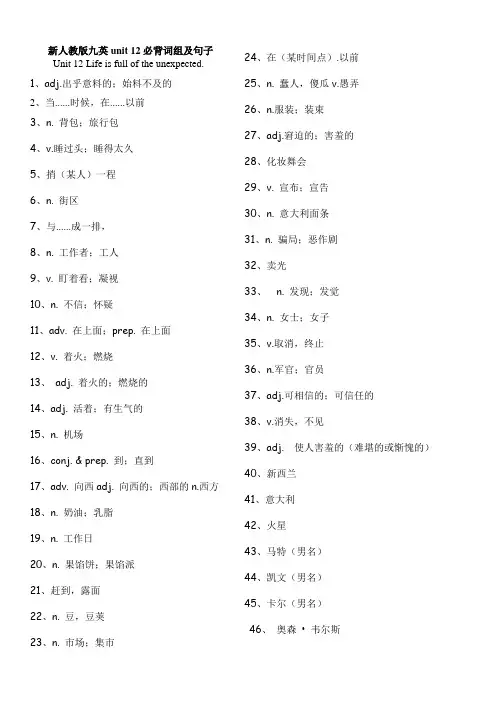
新人教版九英unit 12必背词组及句子Unit 12 Life is full of the unexpected.1、adj.出乎意料的;始料不及的2、当......时候,在......以前3、n. 背包;旅行包4、v.睡过头;睡得太久5、捎(某人)一程6、n. 街区7、与......成一排,8、n. 工作者;工人9、v. 盯着看;凝视10、n. 不信;怀疑11、adv. 在上面;prep. 在上面12、v. 着火;燃烧13、adj. 着火的;燃烧的14、adj. 活着;有生气的15、n. 机场16、conj. & prep. 到;直到17、adv. 向西adj. 向西的;西部的n.西方18、n. 奶油;乳脂19、n. 工作日20、n. 果馅饼;果馅派21、赶到,露面22、n. 豆,豆荚23、n. 市场;集市24、在(某时间点).以前25、n. 蠢人,傻瓜v.愚弄26、n.服装;装束27、adj.窘迫的;害羞的28、化妆舞会29、v. 宣布;宣告30、n. 意大利面条31、n. 骗局;恶作剧32、卖光33、n. 发现;发觉34、n. 女士;女子35、v.取消,终止36、n.军官;官员37、adj.可相信的;可信任的38、v.消失,不见39、adj. 使人害羞的(难堪的或惭愧的)40、新西兰41、意大利42、火星43、马特(男名)44、凯文(男名)45、卡尔(男名)46、奥森• 韦尔斯重点短语:1. give ... a lift/ride 捎(某人)一程2. be full of = be filled with充满了be full of unexpected充满不可预知性3. by the time= when当......时候4.be late for 迟到5. go off发出响声6. keep doing sth 一直做......7. wake up 醒来8. rush out 冲出9. stare at sb凝视某人stare in disbelief at难以置信地盯着.10.in disbelief难以置信11. show up 露面show up赶到,出现put up 张贴,搭建set up建立fix up 修理stand up 起立get up 起床pick up 拾起,捡起look up 查找(资料),向上看turn up 调大音量put up 举起;张贴eat/use up 吃/用光take up 占据;开始从事give up 放弃clean up清理12.arrive in/ at到达13.be about to do sth即将做......14.even though即使;尽管15.wait in line 排队等候16.take off 起飞take a shower洗浴17. turn into转变成18.costume party化妆舞会19.sell out卖光20.get dressed 穿衣服21.stay up 熬夜22.all night 整夜23. Sth happened to sb.某人发生某事24.take place 发生25.play a joke on sb.跟某人开玩笑26. play a trick on sb捉弄某人27.as ... as sb can尽可能.......28. lose weight减肥29. end up doing sth结束做某事30.get married结婚be/get married to sb.与某人结婚31. the luckiest day最幸运的一天32.in the middle of ...在......中间33.after that 在那之后34.lead to 通向35. a bowl of...一碗......36.so ... that... 如此.......一致......37.miss doing sth 错过做某事38. leave my backpack at home把背包忘在家里39.get back to school返回学校40. rush out the door冲出房门41. be about to do sth. 正要做某事42. raise above the burning building从正在燃烧的楼上升起43.go off 发出响声take off 脱下/起飞show off 炫耀shut off 关闭sell out卖完,cut off 切断put off推延[时间]hurry off匆忙离开... turn off关掉... get off下车fall off从...掉下clean off 擦掉give off发出光、热、气味等44.jump out of bed跳下床45. hand in homework 上交作业46. in disbelief 怀疑地47. by the end of that day到那天结束时48. have a happy ending有一个幸福的结局49.be canceled 被取消50. fear spread across the whole country 恐惧席卷整个国家51. the unluckiest day of my life一生中最不幸的一天52. head west 向西行驶53. in the middle of the road在路中间54. turn around 调头55. make an unexpected discovery作一个出乎意料的发现重点句子:1.Life is full of the unexpected.生活充满了意外。
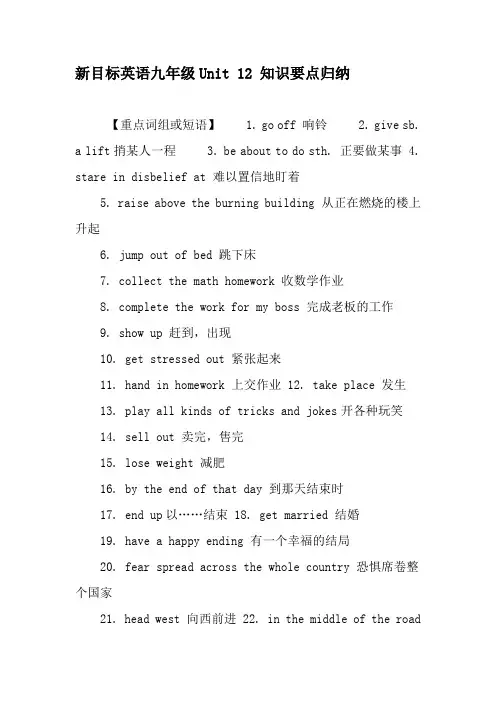
新目标英语九年级Unit 12 知识要点归纳【重点词组或短语】 1. go off 响铃 2. give sb.a lift捎某人一程 3. be about to do sth. 正要做某事 4. stare in disbelief at 难以置信地盯着5. raise above the burning building 从正在燃烧的楼上升起6. jump out of bed 跳下床7. collect the math homework 收数学作业8. complete the work for my boss 完成老板的工作9. show up 赶到,出现10. get stressed out 紧张起来11. hand in homework 上交作业 12. take place 发生13. play all kinds of tricks and jokes开各种玩笑14. sell out 卖完,售完15. lose weight 减肥16. by the end of that day 到那天结束时17. end up以……结束 18. get married 结婚19. have a happy ending 有一个幸福的结局20. fear spread across the whole country 恐惧席卷整个国家21. head west 向西前进 22. in the middle of the road在路中间23. turn around 调头、转身24. make an unexpected discovery 有一个出乎意料的发现25. cancel the plan 取消计划 26. lead to 通向27. miss doing sth. 错过做某事【重难点句子】1. I was about to go up when I decided to get a coffee first.我正准备上去,这时决定先喝一杯咖啡。
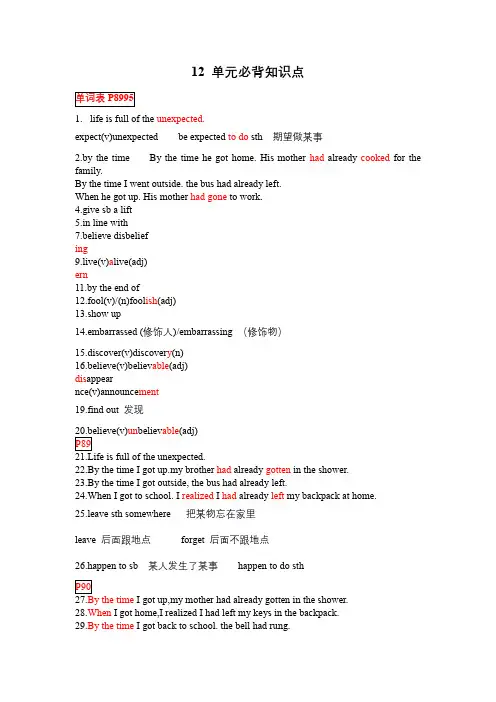
12 单元必背知识点1.life is full of the unexpected.expect(v)unexpected be expected to do sth 期望做某事2.by the time By the time he got home. His mother had already cooked for the family.By the time I went outside. the bus had already left.When he got up. His mother had gone to work.4.give sb a lift5.in line with7.believe disbeliefing9.live(v)a live(adj)ern11.by the end of12.fool(v)/(n)fool ish(adj)13.show up14.embarrassed (修饰人)/embarrassing (修饰物)15.discover(v)discover y(n)16.believe(v)believ able(adj)dis appearnce(v)announce ment19.find out 发现un believ able(adj)22.By the time I got up.my brother had already gotten in the shower.23.By the time I got outside, the bus had already left.24.When I got to school. I realized I had already left my backpack at home.25.leave sth somewhere 把某物忘在家里leave 后面跟地点forget 后面不跟地点26.happen to sb 某人发生了某事happen to do sthI got up,my mother had already gotten in the shower.28.When I got home,I realized I had left my keys in the backpack.29.By the time I got back to school. the bell had rung.30.By the time I walked into class. the teacher had started teaching already.31.go off 响起32.keep doing sth33.Before I got to the bus stop, the bus had already left.un luckily(adv)doing sth/see sb do sth36.arrive in 到达大地方/arrive at 到达小地方37.be about to do sth 计划打算做某事38.decide to do sth39.join 参加某种组织join the army /take part in 参加某种活动40.stare in disbelief believe(v)belief(n) disbelief (n)41.burn(v)burn t/burned42.The airport is big. The planes often take off here.43.By the time I got to the airport, my plane to New Zealand had already taken off.44.I felt lucky to be alive. live(v)a live(adj)45.miss doing sth 错过做某事46.I was about to go up to my office when I decided to get a coffee first.I got up. Tim had already gone into the bathroom.I arrived at the cinema, the movie had started .show up 出现,露面find out 找出,查明50.By the end of the school day, I had already done my homework.51.go off 响起feel embarrass ed感到尴尬53.be fooled by sb foolfoolish54.one of the most famous tricks55.take place /happen 发生56.play tricks/jokes on sb57.report(v)report er(n)58.stop doing sth 停止做某事,正在做/stop to do sth 停止去做某事,没有做59.By the end of the day, more than 10000 people had phoned the TV station to find out how to get the water.60.end up doing sth62.marry sb==marry to sb get married 结婚63.end(v)end ing(n)64.be cancelled 被取消65.rather than 而不是prefer to do sth rather than do sth66.He told they were moving across the United States. across 副词cross 动词67. hundreds of/thousands of …数以百计的/数以千计的,没有具体数字hundred 要加s ,有具体数字不加s ,不加of three hundred /six hundred/seven thousand68.By the time police officers announced that the story was a hoax, thousands of people had left their homes.。
美知【重点词组或短语】【重难点句子】1.go off 响铃2.give sb.a lift 捎某人一程3.be about to do sth.正要做某事4.stare in disbelief at 难以置信地盯着5.raise above the burning building 从正在燃烧的楼上升起6.jump out of bed 跳下床7.collect the math homework 收数学作业plete the work for my boss 完成老板的工作9.show up 赶到,出现10.get stressed out 紧张起来11.hand in homework 交作业12.take place 发生13.play all kinds of tricks and jokes 开各种玩笑14.sell out 卖完,售完15.lose weight 减肥16.by the end of that day 到那天结束时17.end up with 以……结束18.get married 结婚19.have a happy ending 有一个幸福的结局20.fear spread across the whole country 恐惧席卷整个国家21.head west 向西前进22.in the middle of the road 在路中间23.turn around 调头、转身24.make an unexpected discovery 有一个出人乎意料的发现25.cancel the plan 取消计划26.lead to 通向27.miss doing sth.错过做某事28.show up 赶到;露面1.I was about to go up when I decided to get a coffee first.我正准备上去,这时决定先喝一杯咖啡。
2.As I was waiting in line with other office workers,I heard a loud sound.正当我和其他办公室员工在排队等候时,我听到了一声巨响。
九年级Unit 12重点知识一词形词块拓展①agree v. 同意,赞成,应允→disagree v. 不同意,有分歧→ agreement n. 一致,同意→disagreement n. 意见不一,分歧,争论② disappoint v.使失望→disappointment n. 失望;沮丧;扫兴→disappointed adj. 失望的;沮丧的;失意的→disappointing adj. 令人失望的,令人沮丧的,令人扫兴的③ expect v. 预料;期待→expectation n.期待→expected adj. 预料的,预期的→unexpected adj. 出乎意料的;始料不及的④ oversleep v. →overslept(过去式/过去分词)睡过头,睡得太久⑤ burn v. →burned/burnt (过去式/过去分词)→burning (现在分词)着火,燃烧→burning(adj.)着火的,燃烧的get burnt 被晒伤⑥ believe v.相信;认为有可能→belief n. 相信,信仰,信念→believable adj. 可相信的,可信任的;→unbelievable adj. 难以置信的,不真实的→disbelief n.不信,怀疑⑦ work v. 工作n. 作品→worker n. 工作者;工人⑧ fool v. 愚弄→foolish adj. 愚蠢的;→n. 蠢人,傻瓜二重点短语by the time....在.....以前go off (闹钟)发出响声rush out of the door 冲出门外give.....a lift 捎.....一程at least 至少be full of....充满.....be five minutes late for class 上课迟到5分钟even though 即使;尽管wait in line with 和.....排队等候go on 继续,发生stare at sb./sth. 盯着某人/某物in disbelief 不信;怀疑地jump out of bed 从床上跳下来go straight to the airport 直奔机场think to oneself 心中想,盘算wait till the next day 等到第二天hear about 听说the day before 前一天turn into 变成show up 露面;赶到by the end of 在(某时间点)以前get dressed 穿上衣服costume party 化装舞会stay up all night 整晚熬夜April Fool's Day 愚人节an introduction to...对...的介绍take place 发生sell out 卖光lose weight 减肥find out 弄清,查明cancel one's show 取消某人的节目police officers 警官rush to...匆忙去... more than 超过,多于run away from 逃离on the first day of school 在上学第一天turn around 转向;回转hand in 上交be about to do sth. 正要做某事end up doing sth. 以做某事告终across the country 遍及全国spread across the country 传遍全国run out of 用完;耗尽leave my backpack at home 把我的背包忘在家play all kinds of tricks and jokes on each other 互相玩各种各样的把戏和玩笑三.Grammar过去完成时1.When I got to school, I realized I had left my backpack at home.2.By the time I got back to school, the bell had rung.3.But before I got to the bus stop, the bus had already left.Summary:1)意义:过去完成时表示过去某个时间或某个动作____发生的动作,它表示动作发生的时间是“________________”,它是一种相对于___________的时态,没有_________________就没有过去完成时态。
人教九年级Unit12单词短语重点句子Unit 12Life is full of unexpected.Section A一、单词。
1.出乎意料的;始料不及的2.背包;旅行包3.睡过头;睡得太久4.街区5.工作者;工人6.盯着看;凝视7.不信;怀疑8.在……上面在上面9.着火;燃烧10.着火的;燃烧的11.活着;有生气的12.机场13.到;直到14.向西;朝西向西的;西部的西;西方15.奶油;乳脂16.工作日17.果馅饼;果馅派18.豆;豆荚19.市场;集市二、短语。
1.在……以前__________2.把--忘在某处__________把我的背包忘在家里________3.(闹钟)发出响声_________4.穿上_________5.冲出门___________6.捎……一程__________7.即将做某事__________8.即使______________9.排队等候__________10.盯着某物______________11.怀疑,不信____________12.10年之后___________13.醒来________14.从床上跳起来_________15.至少___________16.与……成一排___________ 17.找到;查明_____________18.上课迟到____________19.进入__________20.转变成为一件好事_________21.出发前往……______22.在(某时间点)以前_____________三、句子。
1.当我到家时,我意识到我把钥匙忘在了背包里。
2.生活充满了意外。
Section B一、单词1.蠢人;傻瓜;愚弄__________2.(特定场合穿的)服装;装束 ________3.窘迫的;害羞的 __________4.宣布;宣告 __________5.意大利面条__________6.骗局;恶作剧 __________7.发现;发觉__________8.女士;女子__________9.取消;终止__________10.军官;官员__________11.可相信的;可信任的 __________12.消失;不见__________13.使人害羞的(难堪的或惭愧的) ____二、短语。
英语九年级十二单元知识点英语作为一门重要的国际语言,在我们日常学习中扮演了重要的角色。
九年级是英语学习的关键时期,掌握好知识点对于学生来说至关重要。
在本文中,我将为大家总结九年级英语第十二单元的知识点。
一、词汇1. appreciate:欣赏、感激eg. I appreciate your help.2. behavior:行为eg. His behavior is unacceptable.3. conflict:冲突eg. There is a conflict of interests.4. tradition:传统eg. We celebrate this tradition every year.5. ceremony:仪式eg. They held a graduation ceremony.二、短语和表达1. do harm to:对……有害eg. Smoking does harm to your health.2. get along with:和……相处eg. I get along well with my classmates.3. look forward to:期待eg. I'm looking forward to the weekend.4. be influenced by:受……影响eg. She is influenced by her friends' opinions.5. be familiar with:熟悉eg. I am familiar with this place.三、语法1. 定语从句:用于修饰名词或代词的从句。
eg. The book that I'm reading is very interesting.2. 物主代词:用于表示所有关系的代词。
eg. Is this pen yours?3. 情态动词:表达说话人的情感、观点或态度。
新目标英语九年级第十二单元重点单词、短语、句子和语法小结新目标英语九年级第十二单元重点单词、短语、句子和语法小结I.重点词汇a bit----a little on time---in timequiz----exam at table----at the tablepoint at---point to----point out reach----get to----arrive at/inexcept----besides with----in----byfinally----at last----in the end type----kindhabit----custom particular----special----especialused to----be used to greet sb---say hello to sbrude----inpolite at times----sometimesat first----first of all beside—near---next toII.重点词组1. be supposed to do =should应该\被期望做某事2. shake hands (with)sb握手shake 本意是“摇动、震动”3. should have done sth. “情态动词+现在完成时”表示过去本应该做某事,事实上没有做4. be relaxed about sth.对某事随意、不严格5. make plans to doplan to do. 打算做某事plan on doing6. fancy dress 聚会时所穿的奇装异服7. a fancy dress ball 化妆舞会8. drop by 访问看望拜访串门drop in on sb 顺便走访某人visit sb 拜访come over to9. invite sb. to do sth. 邀请某人做某事Sb be invited to do sth.某人被邀请做某事。
新目标英语九年级第十二单元重点单词、短语、句子和语法小结I.重点词汇a bit----a little on time---in timequiz----exam at table----at the tablepoint at---point to----point out reach----get to----arrive at/inexcept----besides with----in----byfinally----at last----in the end type----kindhabit----custom particular----special----especialused to----be used to greet sb---say hello to sbrude----inpolite at times----sometimesat first----first of all beside—near---next toII.重点词组1. be supposed to do =should应该\被期望做某事2. shake hands (with)sb握手shake 本意是“摇动、震动”3. should have done sth. “情态动词+现在完成时”表示过去本应该做某事,事实上没有做4. be relaxed about sth.对某事随意、不严格5. make plans to doplan to do. 打算做某事plan on doing6. fancy dress 聚会时所穿的奇装异服7. a fancy dress ball 化妆舞会8. drop by 访问看望拜访串门drop in on sb 顺便走访某人visit sb 拜访come over to9. invite sb. to do sth. 邀请某人做某事Sb be invited to do sth.某人被邀请做某事。
10.chopsticks 筷子是由chop(砍)+stick(棒)合成,11. go out of one’s way to do 特意,专门做某事12. make mistakes 犯错误(复数)make a mistake 犯错误(一个)13. be different from 与…不同14. can’t stop doing 忍不住做某事15. learn…by oneself 自学learn sth. by oneself 自学teach oneselfteach +sb.+ 学科教sb某学科16. point to / at sb. “指”物时,只能用to,而“指”人时,to或at都可以用17. be important to sb. 对某人来说非常重要。
18. exchange program 文化交流项目19. drop by one's home 拜访=drop in at+地点20.after all 毕竟first of all 首先21.pick sth. up 捡起、拾起22. make noise 发出令人不愉快的声音、制造噪音23. table manners 餐桌礼仪24. be\get used to sth/doing 习惯于sth/doing be\get used to doing习惯于…be used to do 被用于做…be used for doing被用于做…used to do 过去常常做…25. greet sb (in a right /wrong way ) 问侯26. different customs 不同的风俗27. kiss sb (on the face/cheek/forehead)亲吻脸/脸颊/前额28. feel/be relaxed/nervous 觉得轻松,紧张29.have relaxed/strict rules 有松/紧的规则30. the land of sth /watches …王国31. wipe one's mouth with the napkin用纸巾插嘴32. mind one's (table ) manners 注意…礼仪(1)eat with hands 用手抓着吃(2)talk at the table 在餐桌上讲话(3)pick up one's bowl of rice 端起饭碗(4)start eating first 先开始吃(5)wipe one’s mouth with the napkin 用餐巾纸檫嘴(6)make noise while eating 吃时发出声音33.(7)stick chopsticks into the food 用筷子插进食物里(8)point at sb with the chopsticks用筷子指向某人(9)eat or drank while walking down the street边走边喝(10)put the hands in/on one's lap把手放在大腿上(11)say you're full 说吃饱了(12) sit down from the left side 从右手边坐下(13) eat sth with a fork/knife/spoon/chopsticks用(餐具)吃feel/be full/hungry/empty 感觉很饱/饿34. be full of sthbe filled with sth 充满/装满…sth. occur (in sth) 某事发生35.happen to sb 某人发生sth. take place in 某处发生36.give sb compliments 称赞sb 37.toast sb=make a toast to sb 向sb敬酒38.be unfamiliar to sb/sth 熟悉39.Questions crowded my mind . 我脑袋里充满问题40.be crowded with people 挤满了人41.take out the rubbish/junk/garbage/litter/trash把垃圾拿出去drop litter about 乱丢垃圾42.seek sb/sth 寻找sb.\sth (I seek you = i c q 我找你)43.e-mail chat line 网上聊天热线44.have online conversations with friends和朋友上网聊天45.form good habits 养成好习惯46. combine A to B 把A和B结合42. show the emotion you are feeling把你正感觉着的感情表现出来e-mail sb /a friend (v ) 传送电子邮件给sb43. send an e-mail to sb (n)e-mail English 电子邮件英语44.at the proper/right time 在合适的时间45.cut in line = jump in a queue 插队46.wait in line = wait in a queue 排队等待47.arrive a bit / a little late 迟到一点点48.as many \much + n(s) as I can / possible尽可能多的……49. be + 分钟+ late 迟到(多久)50. get/be angry with sb. 对sb生气get/be angry at sth 对某事生气51. a disaster 一个灾难52. wear the wrong clothes 穿错衣服53. be excited about sth. 对sth很激动54. leave for + 目的地离开去sp55. be allowed to do sth. 被允许做sthSb allow doing sth 某人允许做某事56. what's more 而且57. thanks for doing sth 为….感谢58. host family 房东家59. find/feel it+adj.+to do sth. 发现\感觉做sth…60. have a good school year 有一个好学年61. give sb. lesson on sth. 给sb上关于…的课62. be made in + 地点由某地制造be made of / from 由….制成63. in a western restaurant 在一个西餐厅64. eat with + 餐具用….来吃65. begin with 从…..开始66. in the traditional way 用传统的方法67. make faces 做鬼脸68. send a message to sb. on a mobile phone用手机发短息给sb69. save time 省时70. written English 书面英语71. stick…into…把。
插进72.send a message to 发\送信息给。
73. introduce sb to sbMake sb known to sb 介绍某人给某人74.Wave one’s hand goodbye to sb 向某人挥手告别III.重点句子1. You’re supposed to shake hands.2. You should have asked what you’re supposed to wear.3. Spending time with friends and family is very important to us.4. It’s ver y important to be on time.5. We usually plan to do something interesting.6. Thanks for your message.7. They go out of their way to make me feel at home.8. My biggest challenge is learning how to behave at the dinner table.9. I find it difficult to remember everything.10. I don’t find them so strange any more.11. People can use their computers to talk to each other.12. Using e-mail English helps you write quickly.13. CLS means can’t help laughing.IV.话题语法直接引语怎样变为间接引语窗体顶端直接引用别人原话,叫直接引语。